Related Research Articles
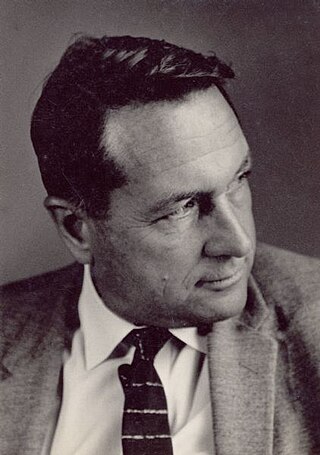
The Highlander Research and Education Center, formerly known as the Highlander Folk School, is a social justice leadership training school and cultural center in New Market, Tennessee. Founded in 1932 by activist Myles Horton, educator Don West, and Methodist minister James A. Dombrowski, it was originally located in the community of Summerfield in Grundy County, Tennessee, between Monteagle and Tracy City. It was featured in the 1937 short film, People of the Cumberland, and the 1985 documentary film, You Got to Move. Much of the history was documented in the book Or We'll All Hang Separately: The Highlander Idea by Thomas Bledsoe.
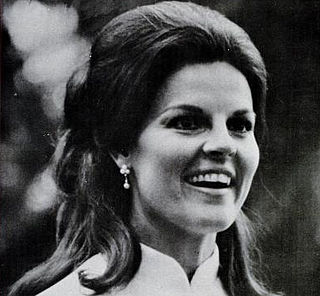
Anita Jane Bryant is an American singer. She had three Top 20 hits in the United States in the early 1960s. She was the 1958 Miss Oklahoma beauty pageant winner, and a brand ambassador from 1969 to 1980 for the Florida Citrus Commission.
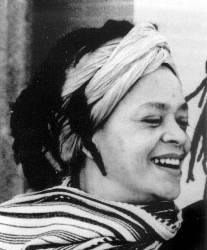
Toni Cade Bambara, born Miltona Mirkin Cade, was an African-American author, documentary film-maker, social activist and college professor.
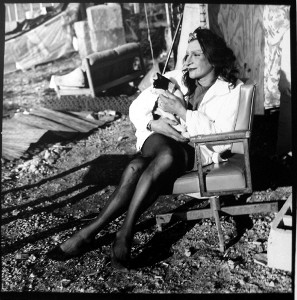
Sylvia Rivera was an American gay liberation and transgender rights activist who was also a noted community worker in New York. Rivera, who identified as a drag queen for most of her life and later as a transgender person, participated in demonstrations with the Gay Liberation Front.

Lesbian, gay, bisexual and transgender (LGBT) people in Georgia face significant challenges not experienced by non-LGBT residents. Georgia is one of only a few countries in the former Soviet space that directly prohibits discrimination against all LGBT people in legislation, labor-related or otherwise. Since 2012, Georgian law has considered crimes committed on the grounds of one's sexual orientation or gender identity an aggravating factor in prosecution. The legislative ban on discrimination has been enacted as a part of the Government efforts to bring the country closer to the European Union and make the country's human rights record in line with the demands of Georgia's European and Euro-Atlantic integration.

Kimberlé Williams Crenshaw is an American civil rights advocate and a leading scholar of critical race theory. She is a professor at the UCLA School of Law and Columbia Law School, where she specializes in race and gender issues.
Cheryl L. Clarke is an American lesbian poet, essayist, educator and a Black feminist community activist who continues to dedicate her life to the recognition and advancement of Black and Queer people. Her scholarship focuses on African-American women's literature, black lesbian feminism, and the Black Arts Movement in the United States. For over 40 years, Cheryl Clarke worked at Rutgers, the State University of New Jersey, and maintains a teaching affiliation with the Graduate Faculty of the Department of Women and Gender Studies, though retired. In addition, Clarke serves on the board of the Newark Pride Alliance. She currently lives in Hobart, New York, the Book Village of the Catskills, after having spent much of her life in New Jersey. With her life partner, Barbara Balliet, she is co-owner of Bleinheim Hill Books, a new, used, and rare bookstore in Hobart. Actively involved in her community, Clarke along with her sister Breena Clarke, a novelist, organizes the Hobart Festival of Women Writers each September

The transgender rights movement is a movement to promote the legal status of transgender people and to eliminate discrimination and violence against transgender people regarding housing, employment, public accommodations, education, and health care. A major goal of transgender activism is to allow changes to identification documents to conform with a person's current gender identity without the need for gender-affirming surgery or any medical requirements, which is known as gender self-identification. It is part of the broader LGBT rights movements.
Prathia Laura Ann Hall Wynn was an American leader and activist in the Civil Rights Movement, a womanist theologian, and ethicist. She was the key inspiration for Martin Luther King Jr.'s "I Have a Dream" speech.
Dawn Atkins is an American writer of nonfiction and fiction, as well as an activist and educator.
Cathy Woolard is an American politician who served as a member of the Atlanta City Council for District 6 from November 1998 to 2002, and as President of the Council from 2002 to 2004. When she began her term in 1997, she was the first openly-gay elected official in Georgia history, and she was the first woman to be President of the Council.
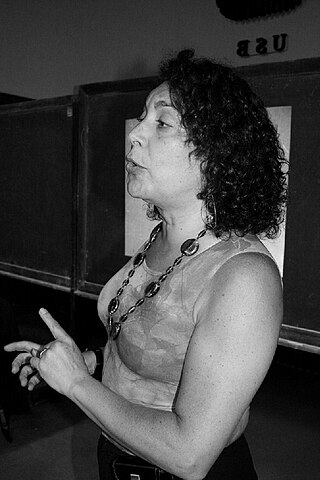
Tamara Adrián is a Venezuelan politician, who was elected to the National Assembly of Venezuela in the 2015 Venezuelan parliamentary election. She is noted as the first transgender person elected to office in Venezuela, and only the second transgender member of a national legislature in the Western Hemisphere. Some early media coverage credited her as the first transgender member of a legislature in the Americas, but this was later corrected due to the election of Michelle Suárez Bértora to the Senate of Uruguay in 2014.

Water protectors are activists, organizers, and cultural workers focused on the defense of the world's water and water systems. The water protector name, analysis and style of activism arose from Indigenous communities in North America during the Dakota Access Pipeline protests at the Standing Rock Reservation, which began with an encampment on LaDonna Brave Bull Allard's land in April, 2016.

Altheia Jones-LeCointe is a Trinidadian physician and research scientist also known for her role as a leader of the British Black Panther Movement of the 1960s and 1970s. Jones-LeCointe came to public attention in 1970 as one of the nine protestors, known as the Mangrove Nine, arrested and tried on charges that included conspiracy to incite a riot, following a protest against repeated police raids of The Mangrove restaurant in Notting Hill, London. They were all acquitted of the most serious charges and the trial became the first judicial acknowledgement of behaviour motivated by racial hatred, rather than legitimate crime control, within the Metropolitan Police.

Janetta Louise Johnson is an American transgender rights activist, human rights activist, prison abolitionist, and transgender woman. She is the Executive Director of the TGI Justice Project. She co-founded the non-profit TAJA's Coalition in 2015. Along with Honey Mahogany and Aria Sa'id, Johnson is a co-founder of The Transgender District, established in 2017. Johnson's work is primarily concerned about the rights and safety of incarcerated and formerly-incarcerated transgender and gender-non-conforming people. She believes that the abolition of police and the prison industrial complex will help support the safety of transgender people, and she identifies as an abolitionist.

African American women played a variety of important roles in the civil rights movement. They served as leaders, demonstrators, organizers, fundraisers, theorists, formed abolition and self-help societies. They also created and published newspapers, poems, and stories about how they are treated and it paved the way for the modern civil rights movement. They were judged by the color of their skin, as well as being discriminated against society because they are women. African American women faced two struggles, both sexism and racism. Womanism fully encompasses the intersectionality between these two social barriers, thus encompassing African American female involvement in the civil rights movement. African American women led organizations and struggles for their suffrage, anti-lynching laws, full employment and especially against the Jim Crow Laws. They had to constantly fight for equality and needed to have a voice in what they can do in society. Black women served a special role as "bridge leaders," forming connections between those in formal positions of power and political constituents. They were the middle person going back and forth between the two groups and provided information to them. African American women actively participated in community organizing and took on informal leadership roles, making substantial grassroots contributions to the movement. They were essential in energizing the neighborhood, planning activities, and building relationships between neighbors. Black women provided crucial safe spaces for activists to plan, strategize, and discuss important problems by hosting meetings and gatherings in their homes. When coordinating activities was not safe or feasible in public locations, this kind of grassroots involvement was especially crucial. The experiences of Black women during the CRM were more nuanced due to the confluence of gender and race. They had to navigate issues of race and gender, and they occasionally encountered prejudice inside the civil rights movement as well as in larger society. Notwithstanding these obstacles, African American women persevered in their endeavors, making a substantial contribution to the movement's eventual triumph. Their leadership and activity opened doors for later generations and demonstrated how important it is to acknowledge and value the diverse roles that Black women have played in the struggle for racial justice and equality. A major turning point was the Montgomery Bus Boycott of 1955, which followed Rosa Park's bold move of not giving up her bus seat. Several notable African American female activists and organizations emerged from this movement, making essential gains in the civil rights agenda, despite restricted access to power and the Cold War atmosphere pushing for silence within the United States.
Abolitionist teaching, also known as abolitionist pedagogy, is a set of practices and approaches to teaching that focus on restoring humanity and pursuing educational freedom for all children in schools. It is rooted in Black critical theory. The term was coined by author and professor Bettina Love.

Yvonne V. Delk is a leader within the United Church of Christ (UCC), a Christian educator and social justice advocate. She was the first Black woman ordained in the United Church of Christ, and the second woman to hold a national leadership role in the denomination, serving as the head of the Office for Church and Society. She later served as executive director of the Community Renewal Society, an organization focused on issues of racism and poverty in Chicago. In this role, she addressed issues of homelessness, poverty, systemic racism, community health and affordable housing. She was the first woman and person of color to lead the organization. In 1997, Delk was recognized by Ebony as one of the top fifteen Black woman preachers in the US. In 2023, she edited and contributed to Afro-Christian Convention: The Fifth Stream of the United Church of Christ, providing history of a forgotten tradition in African-American history.
Lorraine Fontana is an American lesbian activist and founder of the Atlanta Lesbian Feminist Alliance.
References
- ↑ "About". Athens Anti-Discrimination Movement. 2016-09-20. Retrieved 2019-12-31.
- ↑ "Mokah for Georgia to Host Exploratory Meet and Greet". mokahforgeorgia.com. 12 September 2019. Retrieved 2019-12-31.
- ↑ Steinbeck, Foster (2 January 2020). "Athens activist Mokah Jasmine Johnson announces campaign for Georgia House District 117". The Red and Black.
- ↑ "About". United Group Of Artists (UGA Live). 2016-05-25. Retrieved 2019-12-31.
- ↑ Rosalind Bentley, The Atlanta Journal-Constitution. "General Beauregard's closed after alleged racist drink incident". The Atlanta Journal-Constitution. Retrieved 2019-12-31.
- ↑ "About". Athens Anti-Discrimination Movement. 2016-09-20. Retrieved 2019-12-31.
- ↑ "AADM New Leadership and Community Service Program". Athens Anti-Discrimination Movement. 2019-11-23. Retrieved 2019-12-31.
- ↑ "ACTIVIST SPOTLIGHT: Mokah-Jasmine Johnson". Girls Rock Athens. 26 February 2018. Retrieved 2019-12-31.
- ↑ Hammel @jp_hammel, John (November 2016). "Athens-Clarke County commission votes in favor of anti-discrimination ordinance, but leaves out option for citizen input". The Red and Black. Retrieved 2019-12-31.
- ↑ "Get A Sticker". Athens Anti-Discrimination Movement. 2016-10-09. Retrieved 2019-12-31.
- ↑ SandersCorrespondent, Julia. "Swadeshi Black Market seeks to support minority businesses". Athens Banner-Herald. Retrieved 2019-12-31.
- ↑ "Press Release: Teen Social Justice Afterschool Club aims to dismantle the school-to-prison pipeline". Athens Anti-Discrimination Movement. 2019-09-24. Retrieved 2019-12-31.
- ↑ "End School To Prison Pipeline Program". Athens Anti-Discrimination Movement. 2019-09-12. Retrieved 2019-12-31.
- ↑ "Athens Community Wide Diversity, Equity, and Inclusion Plan". Athens Anti-Discrimination Movement. 2017-07-14. Retrieved 2019-12-31.
- ↑ Contributor, Jacqueline GaNun | (19 October 2019). "Athens appoints first Inclusion Officer for new Inclusion Office". The Red and Black. Retrieved 2019-12-31.
{{cite web}}:|last=has generic name (help) - ↑ "Progress on Criminal Justice Reform in Athens". Athens for Everyone. 2019-06-04. Retrieved 2019-12-31.
- ↑ "Commission ends cash bail with the 'Freedom Act'". Athens Politics Nerd. 2019-06-04. Retrieved 2019-12-31.
- ↑ "Meet Mokah". mokahforgeorgia.com. Retrieved 2019-12-31.
- ↑ "She Strut For Justice Empowerment Tour". MOKAH JASMINE JOHNSON. 2019-04-19. Retrieved 2019-12-31.
- ↑ "Board of Elections Members | Athens-Clarke County, GA - Official Website". www.athensclarkecounty.com. Retrieved 2019-12-31.
- ↑ "State Election Board Investigating Athens-Clarke's Decision to Use Hand-Marked Paper Ballots". 6 March 2020.
- ↑ "Spirit of an Activist: Stop Sitting on the Sidelines (Paperback) | Avid Bookshop". www.avidbookshop.com. Retrieved 2019-12-31.